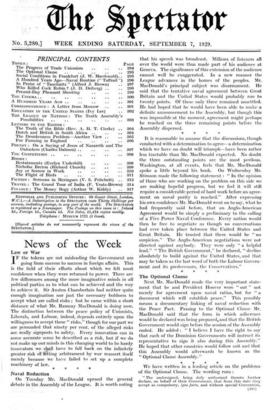It is reasonable to assume that the discussions, though conducted
with a determination to agree—a determination which we have no doubt will triumph—have been rather less tractable than Mr. MacDonald expected. No doubt the three outstanding points are the most perilous. Washington, at all events, feels that Mr. MacDonald spoke a little beyond his book. On Wednesday Mr. Stimson made the following statement : " In the opinion of those who are working on the problem on this side we are making hopeful progress, but we feel it will still require a considerable period of hard work before an agree- ment on naval parity is reached." After expressing his own confidence Mr. MacDonald went on to say, what he had frequently said before, that an Anglo-American Agreement would be simply a preliminary to the calling of a Five Power Naval Conference. Every nation would then be free to negotiate as though no conversations had ever taken place between the United States and Great Britain. He trusted that there would be " no suspicion." The Anglo-American negotiations were not directed against anybody. They were only " a helpful lead." " The British Government," he 'declared, " decline absolutely to build against the United States, and that may be taken as the last word of both the Labour Govern- ment and its predecessors, the Conservatives."
































